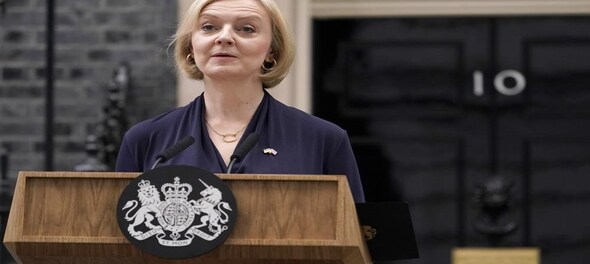
Liz Truss became the shortest-serving prime minister of the United Kingdom after she resigned from the post on Thursday. Her resignation was anticipated with many Tory MPs raising their voices against Truss and her new economic policies. While she maintained for long that she is "a fighter and not a quitter," her reign ended in 45 days with the announcement of her resignation.
Here's a timeline of how political and economic crisis unfolded in the UK, resulting in the downfall of Truss's empire:
September 5:
Truss won UK elections. She succeeded Boris Johnson after winning 57 percent of the votes.
September 6: Truss officially became UK PM after Johnson tendered his resignation to Queen Elizabeth.
September 8: Truss announced that her government will cap soaring consumer energy bills for two years to deal with the economic shock due to the Russia-Ukraine war. The was plan expected to cost the country tens of billions of pounds.
September 8: Queen Elizabeth II, the British monarch, died at 96. Her was followed by ten days of national mourning. This put politics on hold.
September 20-21: Truss travelled to the United Nations General Assembly (UNGA) in New York and held her first in-person meeting with US President Joe Biden.
September 23: UK Finance Minister Kwasi Kwarteng announced a "mini-budget" that included 45 billion pounds ($50 billion) of unfunded tax cuts and huge increases in government borrowing. Following this, the pound plummeted and bond yields rose amid fear of the consequences of inflation and government debt.
September 26: Bank of England Governor Andrew Bailey said that the bank "will not hesitate" to raise interest rates if needed to meet its 2 percent inflation target. He said it was watching financial markets "very closely" after the pound plunged to a record low and British bond prices collapsed in response to the new government’s financial plans.
September 28: To quell the firestorm in Britain’s bond markets, the Bank of England said it will buy as much government debt as needed to restore order.
September 29: Breaking her silence after nearly a week of market upheaval, Truss said she is prepared to make controversial and difficult decisions to get the economy growing. She acknowledged that the UK was facing “very, very difficult economic times”, but said the problems were global and spurred by Russia’s full-scale invasion of Ukraine.
September 30: Truss and Kwarteng held talks to discuss issues with the officials from the Office for Budget Responsibility (OBR) but maintained their fiscal plans.
October 3: Truss and Kwarteng took a U-turn on their new economic policies and reversed a planned cut to the highest rate of income tax. "We get it and we have listened," Kwarteng said in a Twitter post.
October. 6: Truss attended the inaugural meeting of the European Political Community in Prague, with some hoping her decision to attend was the sign of a reset in relations between Brussels and London.
October 5: Truss defends her growth plans, while a key UK mortgage rate exceeds 6 percent for the first time since 2008.
October 10: Kwarteng revealed he will publish a medium-term fiscal plan alongside independent budget forecasts on October 31 rather than in late November as originally planned.
October 11: The Bank of England expanded its programme of daily bond purchases to include inflation-linked debt, citing a “material risk” to British financial stability and “the prospect of self-reinforcing ‘fire sale’ dynamics”.
October 12: The government said it will not reverse its vast tax cuts or reduce public spending despite ongoing market turmoil. British government borrowing costs hit a 20-year high.
October 14: Truss sacked Kwarteng. Jeremy Hunt was appointed as the new finance minister of the UK. She also announced corporation tax will rise to 25 percent, reversing an earlier plan to freeze it at 19 percent.
October 17: Hunt reversed nearly all of the mini-budget and reins in the vast energy subsidy plan. He said changes to planned tax cuts will raise 32 billion pounds and government spending cuts will also be needed.
October 19: Interior minister Suella Braverman resigned after she allegedly sent an official document from her personal email.
October 20: Liz Truss resigned
(With inputs from agency and News 18)
First Published: Oct 21, 2022 1:13 PM IST
Check out our in-depth Market Coverage, Business News & get real-time Stock Market Updates on CNBC-TV18. Also, Watch our channels CNBC-TV18, CNBC Awaaz and CNBC Bajar Live on-the-go!


Lok Sabha Election 2024: Issues raised by Prime Minister Modi have not resonated with people of Tamil Nadu, says Congress
Apr 19, 2024 11:38 PM
West Bengal Lok Sabha elections 2024: A look at Congress candidates
Apr 19, 2024 8:45 PM

